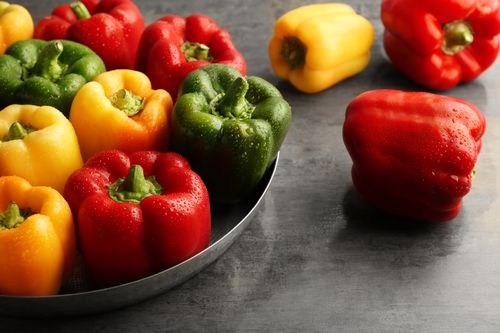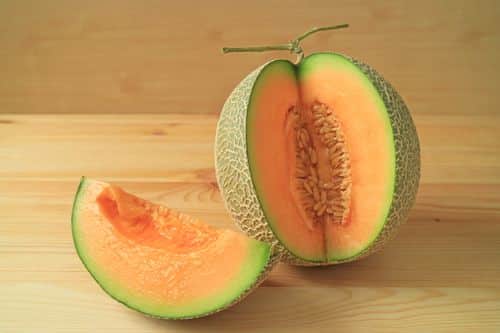10 Best Hydrating Foods to Quench Your Thirst!
Keeping your body hydrated is important especially during the summer when heat and humidity soar high. Drinking water is essential for keeping your body hydrated, but did you know you can hydrate yourself with what’s on your plate and not just with what’s in your glass? Eating healthy hydrating foods during warm weather can help keep your hydration levels up and provide a variety of nutrients. The following foods are not only heavy on water content but are also full of nutrients that will help your body fight off diseases.
These 10 hydrating foods contain at least 88% water, making them a splendid choice for meeting your hydration needs.
10 Hydrating foods you should eat to satisfy your thirst and hunger
#1 Cucumber
Cucumbers are made up almost entirely of water. But, they also provide a slight amount of nutrients, such as potassium, magnesium, and vitamin K.
Cucumbers are also very low in calories compared to other vegetables that are water-rich. In a 52 gram serving of cucumbers, there are only 8 calories. They are also very refreshing because of their high water content.
If you are on a weight-loss journey, you can incorporate this hydrating and refreshing food into your diet by adding it to salads, stir-fries, soups, and sandwiches.
Water content: 95%
#2 Tomatoes
Tomatoes are high in water content. The high amount of water in tomatoes contributes to their low-calorie content, with only 32 calories in a 1-cup serving. They also provide a significant amount of vitamins and minerals, including immune-boosting vitamins A and C and antioxidants, which are beneficial for hydration and protection against several diseases.
You can enjoy tomatoes by adding them to your salads, curries, soups, chutneys and many other dishes.
Water content: 94%
#3 Cauliflower
Cauliflower is an excellent vegetable to include in your diet providing a significant amount of water, fiber, and it is an excellent substitute for grains that are less hydrating. It is also low in calories, with 1 cup consisting of only 25 calories.
This hydrating food comprises over 15 different vitamins and minerals, which support brain health and metabolism.
You can include cauliflower in your diet by replacing it with less-hydrating like cauliflower-based sauces in place of refined wheat flour. You can also swap it with rice or make a cauliflower-based pizza crust which will also help you cut back on extra calories.
Water content: 92%
#4 Lettuce
Lettuce is light, refreshing, has a high amount of water, and several health-promoting properties. It’s one of the best vegetables to help keep you hydrated and full if you are on a weight-loss diet. 1 cup of lettuce has only10 calories. This hydrating food is rich in vitamin K, vitamin A, and folate which may help in keeping your bones and immune system healthy.
You can add lettuce into your diet by using it as a wrap for your rolls or to make light and delicious salads.
Water content: 96%
#5 Cabbage
Eating cabbage may help several aspects of your health, including hydration. This is due to its water, nutrient, and antioxidant contents.
Cabbage is low in calories but is an impressively healthy cruciferous vegetable. It is rich in vitamin C which is well known for helping reduce inflammation and also may lower the risk of chronic diseases like diabetes and heart diseases.
Cabbage can be used to make sabji, paratha, curry, raita, kofta, and salad.
Water content: 92%
#6 Bell peppers
Bell peppers are an incredibly healthy vegetable. They are rich in fiber, vitamins & minerals, such as vitamin B, vitamin C, and potassium. Bell peppers contain the highest amount of vitamin C, compared to other fruits and vegetables, providing 317% of your daily needs in just one cup.
Bell peppers are very low in calories with only 46 calories per cup. If you are looking to lose weight, you can eat a large portion of this hydrating and crunchy food without feeling guilty.
You can include bell peppers in your diet by adding them in salads for the crunch, curries for the flavor, and stir-fries.
Water content: 92%
#7 Watermelon
Watermelon is a sweet and refreshing low-calorie summer snack. It is a hydrating, nutrient-dense fruit that provides your body with health benefits and reduces the risk of chronic illness.
Watermelon is rich in powerful antioxidants, including lycopene. This compound has been studied for its ability to reduce oxidative damage to cells, which has been linked to diseases such as heart disease and diabetes.
This juicy fruit is quite low in calories with 24 calories per cup making it a perfect food for weight watchers to snack on.
You can consume this hydrating fruit as a snack, or by adding it to salads for a sweet and refreshing twist.
Water content: 92%
#8 Muskmelon
Muskmelon is extremely nutritious and may boost your health in several ways. This water-rich fruit also contains fiber, which works together with the high water content to promote fullness and reduce your appetite.
Muskmelon is also rich in vitamin A, which may help boost your immune system and protect your body against infections.
You can eat muskmelon plain or add it to smoothies, yogurt, and salads. This hydrating food also makes a great breakfast accompaniment.
Water content: 90%
#9 Oranges
Oranges are a great source of vitamin C, fiber, and antioxidants. They are a type of low-calorie and highly nutritious citrus fruit.
The presence of vitamin C and potassium may help boost your immune system and improve heart health. Additionally, the presence of disease-fighting antioxidants, including flavonoids, may prevent cell damage by reducing inflammation. Oranges also help you keep your appetite under control owing to the high water content which promotes fullness.
You can incorporate this hydrating food into your diet by adding it in your salads, smoothies, oatmeal, and more.
Water content: 88%
#10 Strawberries
Strawberries are sweet, tangy, and delicious. They are loved by children and adults alike. They are also very healthy and have high water content. Eating strawberries may contribute to your daily water intake because about 91% of their weight comes from water.
Strawberries also provide fiber, disease-fighting antioxidants, vitamins, and minerals, which include vitamin C, folate, and manganese. Eating this hydrating food regularly has been shown to reduce inflammation, which can help protect against heart disease, diabetes, Alzheimer’s, and various types of cancer.
Include strawberries in your diet by adding them in smoothies, salads, plain yogurt, and even sauces.
Water content: 91%
Conclusion
Staying hydrated is extremely important for your overall health. It is recommended to drink at least 8-10 glasses of water per day to meet your hydration needs, but the water content of foods is often overlooked.
You can consume a significant amount of water and meet your hydration goal by including foods that are high in water content such as watermelon, tomatoes, oranges, lettuce, and more.
Stay hydrated and stay healthy.
Frequently Asked Questions (FAQs)
A. Although there are many symptoms of dehydration, which can range from mild dehydration to severe – 3 symptoms that can be common are fatigue, increased thirst, dry mouth & tongue. Other mild symptoms include decreased urination, less tear production, dry skin, constipation, dizziness, lightheadedness, and headache. Severe dehydration can cause symptoms such as excessive thirst, lack of sweat production, low blood pressure, rapid heart rate, rapid breathing, sunken eyes, shriveled skin, and dark urine. Severe symptoms are a sign to seek immediate medical attention.
A. One can opt for lemon water, buttermilk, coconut water along with foods that are water-rich such as cucumbers, tomatoes, cauliflower, watermelon, oranges, and muskmelon.










